Though many crypto exchanges are beginning to offer NFTs to their users, the most common way to buy an NFT is through specialised NFT marketplaces. These marketplaces typically offer a range of functions beyond the trading of NFTs, and often include competitions, games and the ability to mint your own digital asset.
The best NFT marketplaces
- Best overall NFT marketplace: OpenSea
- Best Australian NFT marketplace: CoinSpot NFT Marketplace
Compare more NFT marketplaces
Use the table to compare NFT marketplaces on things like types of NFTs available (categories), payment methods, and whether they let you sell your own NFTs (known as minting). Once you've found a marketplace that suits you, click on the "Go to Site" button to create an account and start exploring the exciting world of NFTs.
What are NFT marketplaces?
NFT marketplaces are digital platforms where users can buy, sell, trade, show off and create their own NFTs.
While NFT marketplaces vary in functionality, they all operate on a similar basis – they are essentially a storefront built on the blockchain that specialises in NFTs.
Potential NFT investors will typically need to have access to a cryptocurrency wallet and compatible crypto coins in order to participate in the marketplace, whether it be for trading NFTs or engaging in community events.

"Look for a secure marketplace with low fees, a wide selection of NFTs, a user-friendly interface, and strong community support for artists and collectors. These factors can help ensure a good experience buying and selling NFTs."
What to look out for
As NFTs have surged in popularity, so too has the number of platforms that can be used to exchange these digital assets. This may make it difficult for newcomers to decide which marketplace is right for them. With this in mind, here are a few things worth considering when looking into NFT trading platforms.
Type of NFTs offered
Certain NFT marketplaces like OpenSea operate on a "jack-of-all-trades" basis and give their clientele a wide-ranging selection of NFTs to purchase from. Conversely, others have a more niche selling point and deal exclusively in that. For example, NBA Top Shot's platform only sells digital highlights from NBA basketball in trading card format.
Fees
As the majority of NFT marketplaces are built on a blockchain, transactions will usually be accompanied by a gas fee. This varies from platform to platform, and often depends on the underlying protocol being utilised. For example, an NFT platform built on Ethereum will likely have higher fees than one using Binance Smart Chain.
Cryptocurrency exchanges
Some NFT platforms have an exchange integrated in their marketplace, which allows users to buy cryptocurrency (which they can then use to purchase NFTs) all on the same website. Binance and Crypto.com are 2 reputable exchanges which have integrated an NFT marketplace into their services.
Minting NFTs
The creation of NFTs may be a niche requirement for some investors, but it is a large aspect of the NFT ecosystem. It's worth considering whether this is an avenue you'd like to pursue down the line and may influence which NFT marketplace you ultimately decide to use. This function is particularly pertinent for content creators and artists.
Marketplace games and events
Those that want to get a little more out of their NFTs may prefer a marketplace that has additional gameplay. For example, ZED RUN is an NFT marketplace that allows users to purchase a digital racehorse and run it in races. Its performance is dictated by pedigree, as well as rarity, which also influences the price. Multiple other marketplaces offer similar features.
What types of NFTs can you buy in marketplaces?
As NFTs grow in popularity, they simultaneously grow in concept. Originally, most NFT marketplaces offered digital art or collectibles (the first major offerings to gain public traction being CryptoPunks and CryptoKitties.)
The potential of NFTs has expanded to include compatibility for nearly any imaginable digital file, and many NFT trading platforms provide a wide range of categories for investors to choose from.
Prominent NFT categories include:
| Category | Description | Prominent marketplace(s) |
|---|---|---|
| Digital art | Any sort of art that has been created on a digital device (computer, phone or tablet). | SuperRare, Nifty Gateway, Mintable, Rarible |
| Memes | An image or video that is passed on to other people and often altered to match current events in popular culture. | Meme, Mintable, Rarible, OpenSea |
| Photography | An image taken with a camera that may be digitally altered. | AirNFTs, GhostMarket, Foundation, OpenSea |
| Games | Digital items or avatars that can be used in a video game, or an entire NFT marketplace built around a single game ecosystem (sometimes known as a metaverse). | ZED RUN, Axie Infinity, Rarible |
| Collectibles | Typically virtual trading cards, collectibles take the form of any digital creation that has identifiable attributes that impact value (e.g. a breed lineage or a serial number). | NBA Top Shot, OpenSea, Rarible |
| Metaverses | A metaverse is essentially any digital environment where humans interact, often associated with a video game. In the case of NFTs, they can take the shape of avatars or digital land. | NFTworld.io, Rarible, Decentraland |
| Music | Any sort of music contained within a digital file can be minted or purchased as an NFT. | OpenSea, Nifty Gateway, Opulous |
| Domains | Users can purchase and own NFTs backed by domain names on the blockchain. | Unstoppable Domains, Rarible, OpenSea |
What do NFT marketplace tokens do?
Not every NFT marketplace has a native token – many use ETH or BNB as their primary currency. Those that do, such as Rarible's RARI token, have a varying range of functions.
Certain NFT marketplace tokens are solely used for transactions, be it the purchase or sale of NFTs, as well as to pay for the cost of gas fees.
Some platforms require their native token to be used whenever a user mints a new NFT.
Finally, certain decentralised NFT marketplaces have shifted their governance model to that of a decentralised autonomous organisation (DAO), where token holders are eligible to vote on and submit proposals on the development of the platform. Rarible is the most well-known NFT marketplace that uses a DAO governance system.
Common NFT marketplace fees
As with most applications on the blockchain, participating in an NFT marketplace comes with a range of fees that should be considered.
Each platform's fees will vary based on their economic model, but there are a few distinct occasions when fees are likely to be relevant.
Transactions (the purchase or sale of an NFT) will often incur a fee, which can be a fixed rate or a proportion of the sale price.
Minting new tokens will usually be accompanied by a gas fee, which helps pay for the computational and resource expenditure of the relevant blockchain. Some platforms, like Mintable, offer this feature for free.
Finally, depending on the payment method (for example, bank transfer or direct purchase from wallet), users may rack up fees for withdrawing and depositing funds into their NFT marketplace account.
It may be worth assessing the various fee structures for NFT platforms you are interested in joining prior to signing up. Our individual review pages have a breakdown of fees for each platform.
Are NFT marketplaces safe to use?
NFT marketplaces are a relatively novel venture in the crypto space, with many only being a couple of years old. Like everything on the blockchain, there are inherent risks with using NFT marketplaces. Hacks and exploits have occurred in the past, with users losing expensive NFTs as a result.
NFTs are inherently smart contracts, and are also at the mercy of any smart contract bugs that might pop up.
Peer-to-peer NFT marketplaces come with the same issues that regular P2P marketplaces do and may be rife with scammers or price gougers.
With all of that in mind, well-regulated and economically secure NFT marketplaces are just as safe to use as any other respected crypto exchange, as long as the above risks are accounted for.
How to buy NFTs on an NFT marketplace
Purchasing NFTs on a marketplace is a relatively simple process. For the purposes of this guide, we're using the MetaMask wallet and OpenSea marketplace, but the process will be similar depending on which wallet and marketplace you want to use.
- Create an account. Head over to the OpenSea web page and sign up. To accomplish this, you must have set up a supported crypto wallet like MetaMask. If you haven't done so already, head over to this guide to see how.
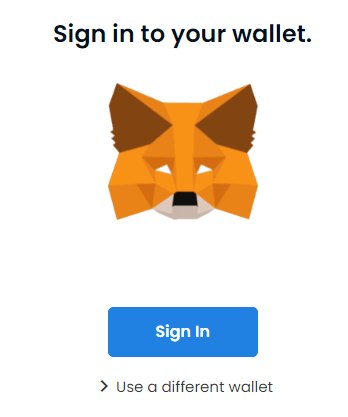
- Enter user details. Once you've linked your wallet to OpenSea, enter in the required details.
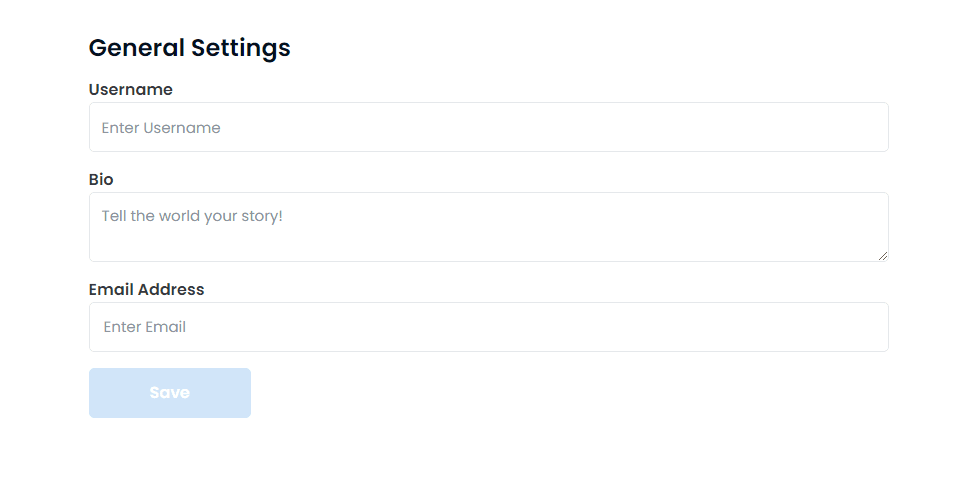
- Verify your email address.To finish setting up your account, go to your email and follow the relevant instructions.
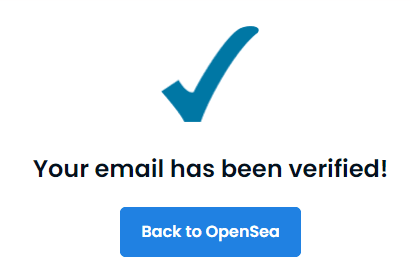
- Select the NFT you wish to purchase. Head over to the NFT marketplace and browse through the millions of available NFTs.
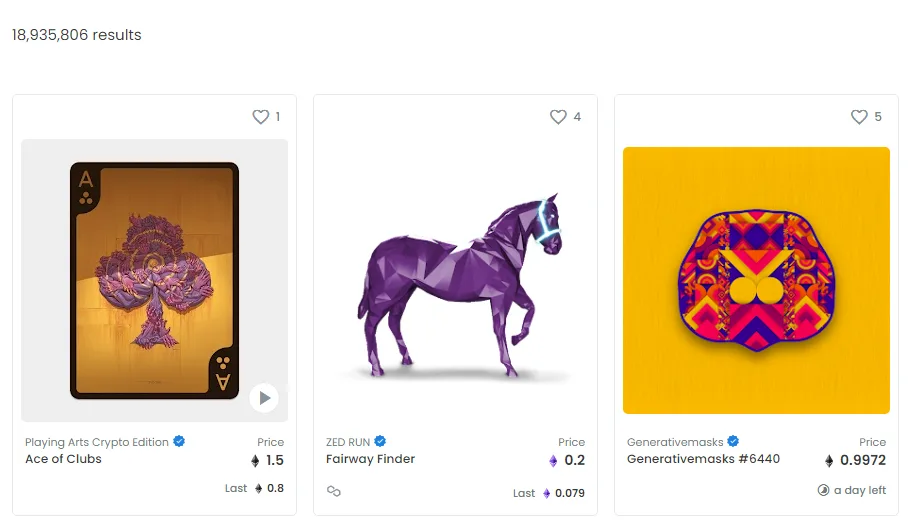
- Ensure the required funds are in your wallet. Once you've selected an NFT you wish to purchase, make a note of the price and make sure you've deposited that amount (and a little more for transaction fees) to your wallet. Once done, simply select "Buy now", or make an offer.
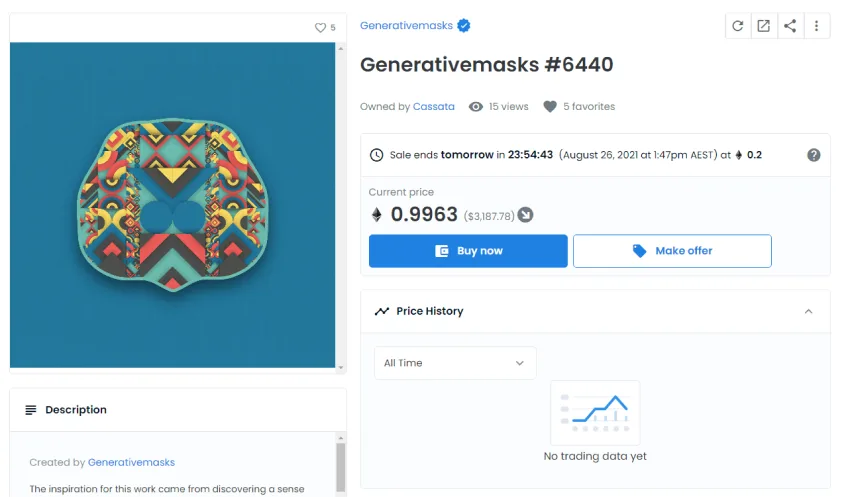
- View your NFT collection! Once the transaction has been executed, simply head over to the "My Collections" tab to view your shiny new collectible!
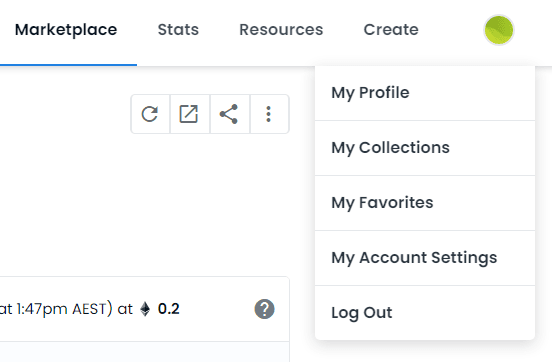
Frequently asked questions
Ask a question
Read more on NFT Marketplaces
-
CoinSpot NFT marketplace review
Read our review of buying and selling NFTs on CoinSpot’s NFT marketplace
-
OpenSea review and guide
An in-depth review and guide to buying and selling NFTs on OpenSea.
